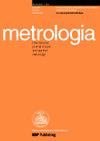A Bayesian statistical method for large-scale MEMS-based sensors calibration: a case study on 100 digital accelerometers
IF 2.4
3区 工程技术
Q2 INSTRUMENTS & INSTRUMENTATION
引用次数: 0
Abstract
Low-cost sensors and in particular micro-electro-mechanical systems (MEMS) devices are widely used in many applications, including consumer electronics, healthcare, automotive, and industrial automation. Their large-scale production (typically in the order of millions per week in a single factory) would require the calibration of a huge number of devices that would be costly and time-consuming. A solution can be found in the use of statistical methods in order to (at least partially) substitute for the typical calibration procedures. In this work, we propose a Bayesian method to statistically calibrate large batches of sensors using probabilistic models and prior knowledge. The method involves experimentally calibrating only a small sample of sensors, then infer the number of reliable sensors in the entire batch and assign an appropriate uncertainty to all the sensors. Therefore, it can be considered as a statistical calibration of the batch. The Bayesian nature of this approach allows reducing the number of experimental calibrations by incorporating the prior knowledge coming from the previous calibration of a ‘benchmark’ batch, which is performed ‘once and for all’ and is representative of the whole production process. The application and validation of the method are performed through the calibration of 100 digital MEMS accelerometers. Validation results showed an acceptable agreement between experimental-based bootstrap and theoretical values, with relative differences within ±7%.基于 MEMS 的大规模传感器校准贝叶斯统计方法:100 个数字加速度计的案例研究
低成本传感器,特别是微机电系统(MEMS)设备被广泛应用于许多领域,包括消费电子、医疗保健、汽车和工业自动化。这些设备的大规模生产(通常单个工厂每周生产数百万个)需要对大量设备进行校准,成本高昂且耗时。为了(至少部分)替代典型的校准程序,可以通过使用统计方法来找到解决方案。在这项工作中,我们提出了一种贝叶斯方法,利用概率模型和先验知识对大批传感器进行统计校准。该方法只对少量传感器样本进行实验校准,然后推断出整批传感器中可靠传感器的数量,并为所有传感器分配适当的不确定性。因此,可以将其视为批次的统计校准。这种方法具有贝叶斯性质,可以将以前校准 "基准 "批次时获得的先验知识纳入其中,从而减少实验校准的次数,因为 "基准 "批次的校准是 "一劳永逸 "的,可以代表整个生产过程。通过校准 100 个数字 MEMS 加速计,对该方法进行了应用和验证。验证结果表明,基于实验的自举法与理论值之间的一致性可以接受,相对差异在 ±7% 以内。
本文章由计算机程序翻译,如有差异,请以英文原文为准。
求助全文
约1分钟内获得全文
求助全文
来源期刊

Metrologia
工程技术-物理:应用
CiteScore
2.80
自引率
25.00%
发文量
137
审稿时长
12 months
期刊介绍:
Published 6 times per year, Metrologia covers the fundamentals of measurements, particularly those dealing with the seven base units of the International System of Units (metre, kilogram, second, ampere, kelvin, candela, mole) or proposals to replace them.
The journal also publishes papers that contribute to the solution of difficult measurement problems and improve the accuracy of derived units and constants that are of fundamental importance to physics.
In addition to regular papers, the journal publishes review articles, issues devoted to single topics of timely interest and occasional conference proceedings. Letters to the Editor and Short Communications (generally three pages or less) are also considered.
 求助内容:
求助内容: 应助结果提醒方式:
应助结果提醒方式:


